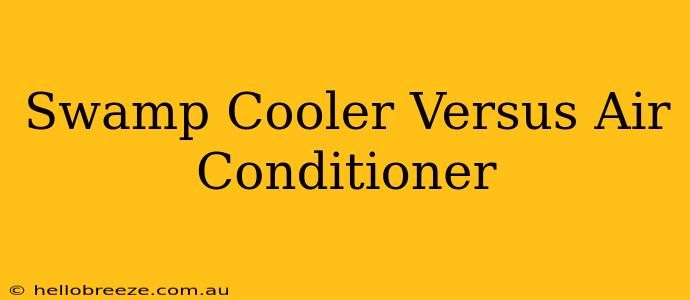Choosing between a swamp cooler and an air conditioner can be a tough decision. Both offer cooling relief, but they work in vastly different ways and are suited to different climates and budgets. This guide will break down the key differences to help you decide which is the best option for your needs.
How Swamp Coolers Work
Swamp coolers, also known as evaporative coolers, work on a simple principle: evaporation cools. They draw in hot, dry air and pass it over a wet pad. As the water evaporates, it absorbs heat from the air, resulting in a cooler breeze. This makes them incredibly energy-efficient, especially in dry climates.
Advantages of Swamp Coolers:
- Energy Efficiency: Swamp coolers use significantly less energy than air conditioners, leading to lower electricity bills.
- Lower Initial Cost: They typically cost less to purchase and install than air conditioners.
- Environmentally Friendly: Their low energy consumption makes them a more eco-friendly choice.
- Improved Air Quality: The evaporation process can add moisture to the air, which can be beneficial in dry climates.
Disadvantages of Swamp Coolers:
- High Humidity: Swamp coolers are not effective in humid climates. The added moisture will make the air feel sticky and uncomfortable.
- Limited Cooling Power: They don't cool as effectively as air conditioners, particularly in hot, humid, or high-altitude areas.
- Maintenance: They require regular cleaning and maintenance of the evaporative pads to prevent the growth of mold and mildew.
- Air Quality Concerns (in some cases): If the water used isn't properly treated, it can introduce allergens or other contaminants into the air.
How Air Conditioners Work
Air conditioners work by removing heat from the air inside your home and transferring it outside. They use a refrigerant that absorbs heat and then releases it outside, leaving cooler air inside.
Advantages of Air Conditioners:
- Powerful Cooling: Air conditioners provide significantly more powerful cooling than swamp coolers, regardless of climate.
- Effective in Humid Climates: They work effectively in humid environments where swamp coolers would be ineffective.
- Improved Air Quality: Many modern air conditioners include air filters to remove dust, pollen, and other allergens from the air.
- Consistent Cooling: They provide consistent cooling, unlike swamp coolers which can be affected by outside temperature and humidity.
Disadvantages of Air Conditioners:
- High Energy Consumption: Air conditioners consume significantly more energy than swamp coolers, resulting in higher electricity bills.
- Higher Initial Cost: The purchase and installation costs are typically much higher than for swamp coolers.
- Environmental Impact: Their high energy consumption contributes to a larger carbon footprint.
- Can Dry Out Air: Air conditioners can significantly dry out the air, especially in already dry climates.
Swamp Cooler vs. Air Conditioner: The Verdict
The best choice depends entirely on your specific needs and climate.
Choose a swamp cooler if:
- You live in a dry climate with low humidity.
- You're on a tight budget.
- You prioritize energy efficiency and environmental friendliness.
Choose an air conditioner if:
- You live in a humid climate.
- You need powerful and consistent cooling.
- You're willing to pay a higher initial cost and electricity bill.
By carefully considering these factors, you can make an informed decision about which cooling system is best for your home and lifestyle. Remember to factor in the long-term costs, including energy consumption and maintenance, when making your final choice.

